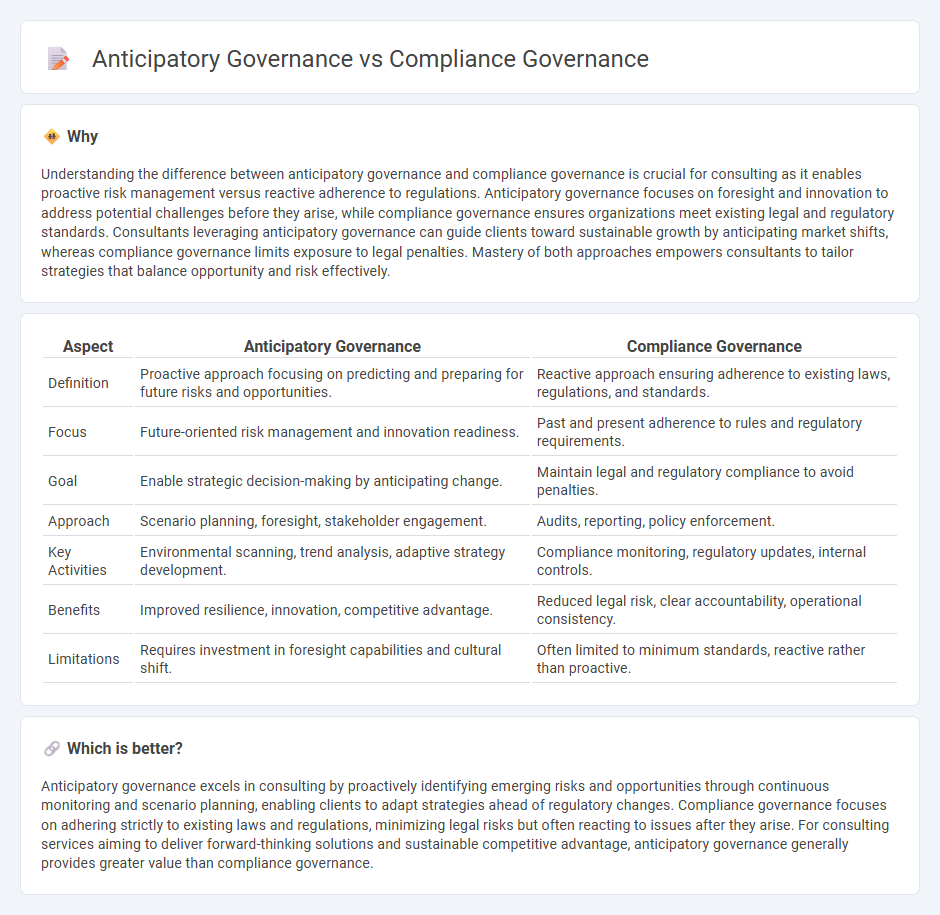
Consulting in anticipatory governance focuses on proactive strategies, enabling organizations to foresee and adapt to future challenges through innovation and risk management frameworks. Compliance governance, by contrast, emphasizes adhering to existing laws, regulations, and standards to minimize legal and operational risks. Explore how consulting can tailor governance models to align with your organization's goals and regulatory environment.
Why it is important
Understanding the difference between anticipatory governance and compliance governance is crucial for consulting as it enables proactive risk management versus reactive adherence to regulations. Anticipatory governance focuses on foresight and innovation to address potential challenges before they arise, while compliance governance ensures organizations meet existing legal and regulatory standards. Consultants leveraging anticipatory governance can guide clients toward sustainable growth by anticipating market shifts, whereas compliance governance limits exposure to legal penalties. Mastery of both approaches empowers consultants to tailor strategies that balance opportunity and risk effectively.
Comparison Table
| Aspect | Anticipatory Governance | Compliance Governance |
|---|---|---|
| Definition | Proactive approach focusing on predicting and preparing for future risks and opportunities. | Reactive approach ensuring adherence to existing laws, regulations, and standards. |
| Focus | Future-oriented risk management and innovation readiness. | Past and present adherence to rules and regulatory requirements. |
| Goal | Enable strategic decision-making by anticipating change. | Maintain legal and regulatory compliance to avoid penalties. |
| Approach | Scenario planning, foresight, stakeholder engagement. | Audits, reporting, policy enforcement. |
| Key Activities | Environmental scanning, trend analysis, adaptive strategy development. | Compliance monitoring, regulatory updates, internal controls. |
| Benefits | Improved resilience, innovation, competitive advantage. | Reduced legal risk, clear accountability, operational consistency. |
| Limitations | Requires investment in foresight capabilities and cultural shift. | Often limited to minimum standards, reactive rather than proactive. |
Which is better?
Anticipatory governance excels in consulting by proactively identifying emerging risks and opportunities through continuous monitoring and scenario planning, enabling clients to adapt strategies ahead of regulatory changes. Compliance governance focuses on adhering strictly to existing laws and regulations, minimizing legal risks but often reacting to issues after they arise. For consulting services aiming to deliver forward-thinking solutions and sustainable competitive advantage, anticipatory governance generally provides greater value than compliance governance.
Connection
Anticipatory governance leverages predictive analytics to identify potential regulatory risks, enabling proactive compliance management. Compliance governance ensures adherence to legal frameworks by integrating foresight mechanisms that anticipate changes in regulations. Together, they create a dynamic system that mitigates risk through continuous monitoring and adaptive strategy implementation.
Key Terms
Regulatory Adherence (Compliance Governance)
Compliance governance centers on ensuring organizations strictly follow established laws, regulations, and industry standards to avoid legal penalties and maintain stakeholder trust. It involves systematic monitoring, reporting, and risk management practices to enforce regulatory adherence effectively. Explore how integrating compliance governance solidifies risk management frameworks and enhances corporate responsibility.
Proactive Risk Management (Anticipatory Governance)
Proactive risk management in anticipatory governance involves identifying potential risks early and implementing strategies to mitigate them before they escalate, contrasting with compliance governance's focus on adhering to established regulations and standards. Anticipatory governance leverages data analytics, scenario planning, and continuous monitoring to foresee challenges and adapt policies dynamically. Explore how anticipatory governance drives innovation and resilience by staying ahead of risks in complex regulatory environments.
Policy Implementation
Compliance governance emphasizes strict adherence to existing policies and regulatory frameworks during policy implementation, ensuring organizations meet established standards and legal requirements. Anticipatory governance, by contrast, focuses on proactive strategy development and foresight to address emerging challenges and adapt policies before issues arise. Explore how these governance approaches impact effective policy implementation and organizational resilience.
Source and External Links
Compliance Governance - Compliance governance ensures organizations adhere to regulatory requirements, mitigate risks, and maintain ethical practices by establishing frameworks for governance, risk, and compliance (GRC) activities, fostering integrity and accountability.
Compliance Governance: What It Is & How to Develop ... - Compliance governance is a leadership system responsible for decision-making in risk management and regulatory compliance, involving company leaders to maintain and enforce policies especially in regulated industries.
Governance, risk management, and compliance - GRC integrates governance, risk management, and compliance to ensure organizations achieve objectives, manage risks, and adhere to legal and ethical standards efficiently by synchronizing these processes.
 dowidth.com
dowidth.com